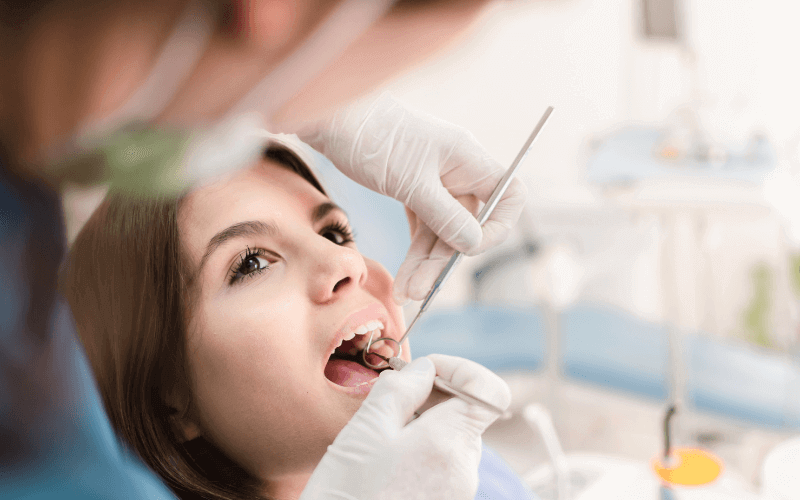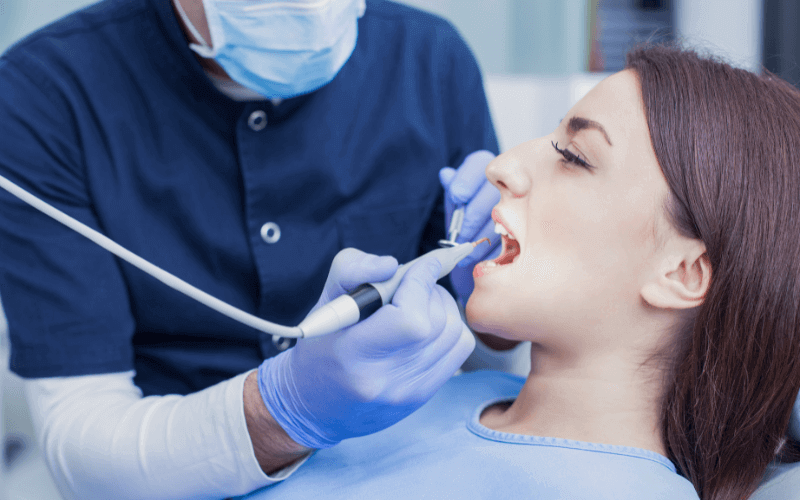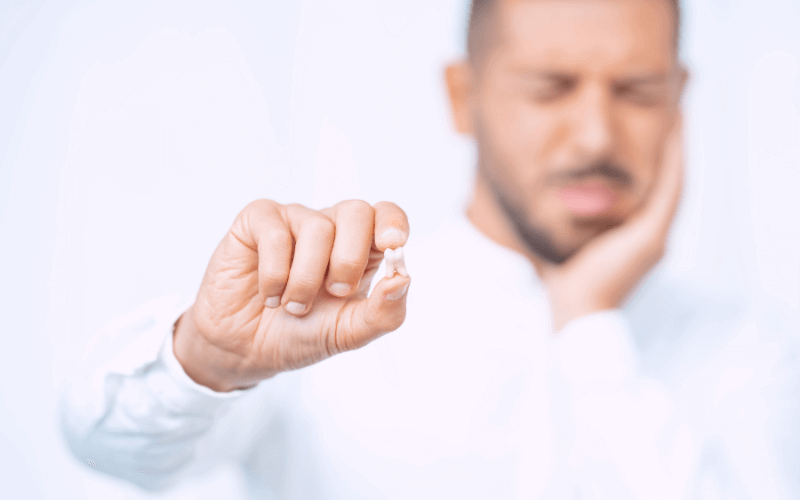Having a tooth knocked out can be distressing, but quick and effective action can significantly increase the chances of saving the tooth. Known as an avulsed tooth, this dental emergency requires immediate attention to maximise the likelihood of successful reimplantation. Whether due to an accident, sports injury, or other trauma, knowing the correct steps to take when a tooth is knocked out is crucial for both adults and children.
In this guide, we will walk you through the essential steps to take immediately after a tooth is knocked out, how to handle the tooth correctly, and the importance of seeking prompt dental care. Additionally, we will cover post-reimplantation care, preventive measures to avoid future incidents, and answer some common questions about knocked-out teeth.
In this blog:
- Immediate Steps to Take In Case Of A Knocked-Out Tooth
- Seeking Immediate Dental Care
- Preventive Measures to Avoid Future Incidents
- FAQs About Knocked-Out Teeth
Immediate Steps to Take In Case Of A Knocked-Out Tooth
Stay Calm
The first and most important step is to stay calm. Panic can hinder your ability to manage the situation effectively. Take a deep breath and focus on the following steps to increase the chances of saving the knocked-out tooth.
Handle the Tooth Properly
- Pick Up by the Crown: Carefully pick up the tooth by the crown (the part that is visible in the mouth), avoiding the root to prevent damaging the delicate cells necessary for reattachment.
- Avoid Touching the Root: Do not touch, scrub, or clean the root as this can damage the fibers that aid in reimplantation.
Rinse the Tooth
- Gently Rinse with Water: If the tooth is dirty, gently rinse it with water. Do not use soap, chemicals, or scrub the tooth. Hold it by the crown and rinse briefly under running water to remove any debris.
- Do Not Dry or Wrap the Tooth: Avoid drying the tooth or wrapping it in tissue or cloth as this can damage the root cells.
Reinsert the Tooth if Possible
- Try to Reinsert the Tooth: If you can, try to reinsert the tooth into the socket. Hold the tooth by the crown and gently push it into the socket. Ensure it is facing the correct way.
- Hold the Tooth in Place: Once the tooth is back in the socket, hold it in place by gently biting down on a piece of gauze or a clean cloth.
Keep the Tooth Moist
If you cannot reinsert the tooth, it is crucial to keep it moist:
- Place in Milk: Place the tooth in a container of milk. Milk is an ideal medium for preserving the tooth temporarily as it helps maintain the viability of the periodontal ligament cells.
- Saline Solution: Alternatively, you can place the tooth in a saline solution or hold it inside your cheek. Avoid using plain water as it can damage the root cells.
Seek Immediate Dental Care
- Contact a Dentist Immediately: Time is critical in saving a knocked-out tooth. Try to get to a dentist within 30 minutes. The sooner you see a dental professional, the better the chances of successful reimplantation.
- Visit an Emergency Room if Necessary: If you are unable to reach a dentist quickly, consider going to an emergency room where they can provide initial care and help preserve the tooth until you can see a dental specialist.
By following these steps promptly and carefully, you can significantly improve the chances of saving a knocked-out tooth.
Seeking Immediate Dental Care

Contact an Emergency Dentist Immediately
- Act Quickly: Time is of the essence when dealing with a knocked-out tooth. The best chance of saving the tooth is to see a dentist within 30 minutes. Contact your dentist or an emergency dental clinic as soon as possible.
- Provide Details: When contacting the dentist, explain the situation clearly, including how the tooth was knocked out and any other symptoms you may be experiencing.
What to Expect at the Dentist
- Initial Examination: Upon arrival, the dentist will conduct a thorough examination of the mouth, the knocked-out tooth, and the surrounding tissues. They will check for any additional injuries and assess the condition of the tooth.
- Reimplantation Procedure:
- Cleaning the Tooth: If the tooth has been stored correctly, the dentist will clean it carefully, avoiding any further damage to the root surface.
- Reinserting the Tooth: The dentist will then attempt to reinsert the tooth into the socket. They will ensure the tooth is properly positioned and may use a splint to stabilise it, attaching it to the adjacent teeth.
- X-rays: The dentist may take X-rays to confirm the tooth is correctly positioned and to check for any other potential injuries.
- Discussing Prognosis: The dentist will discuss the prognosis with you, explaining the likelihood of the tooth reattaching successfully and any potential complications. They will also outline the necessary follow-up care and appointments.
Follow-Up Care and Monitoring
- Post-Reimplantation Care: Proper care after the reimplantation is crucial for the tooth’s survival. The dentist will provide instructions on how to care for the reimplanted tooth, including:
- Oral Hygiene: Maintain good oral hygiene by gently brushing your teeth and avoiding the area around the reimplanted tooth.
- Dietary Recommendations: Eat soft foods and avoid biting down on the reimplanted tooth to prevent dislodging it.
- Medications: The dentist may prescribe antibiotics to prevent infection and recommend over-the-counter pain relievers to manage discomfort.
- Regular Check-Ups: Schedule and attend all follow-up appointments with your dentist to monitor the healing process. Regular check-ups will help ensure the tooth is stabilising correctly and identify any issues early.
- Monitoring for Complications: Be vigilant for signs of complications, such as increased pain, swelling, or infection. Contact your dentist immediately if you experience any of these symptoms.
By following these post-reimplantation care guidelines and closely monitoring for complications, you can significantly enhance the chances of successfully saving your knocked-out tooth. Always follow your dentist’s instructions and attend all follow-up appointments to ensure the best possible outcome.
Suggested Reading: Don’t Delay Dental Care: Risks Of Ignoring Cracked Or Chipped Teeth
Preventive Measures to Avoid Future Incidents
Taking preventive measures can significantly reduce the risk of experiencing a knocked-out tooth. Here are some steps you can take to protect your teeth and ensure their long-term health:
Use of Mouthguards
During Sports
- Custom-Fitted Mouthguards: Wear a custom-fitted mouthguard during contact sports and activities that pose a risk of dental injury. Custom mouthguards provide better protection and comfort compared to over-the-counter options.
- Consistent Use: Make it a habit to wear a mouthguard every time you participate in sports, not just during games but also during practice sessions.
Night Guards
- For Teeth Grinding: If you grind your teeth at night (bruxism), consider using a night guard to protect your teeth from excessive wear and potential damage.
Routine Dental Care
Regular Check-Ups
- Biannual Visits: Schedule regular dental check-ups every six months. These visits help detect and address dental issues before they become severe.
- Professional Cleanings: Professional cleanings remove plaque and tartar buildup, reducing the risk of gum disease and tooth decay.
Suggested Reading: How Often Should You Go To The Dentist?
Proper Oral Hygiene
- Brushing and Flossing: Brush your teeth at least twice a day and floss daily to maintain good oral hygiene. This helps prevent decay and strengthens your teeth.
- Fluoride Treatments: Use fluoride toothpaste and consider fluoride treatments to strengthen your teeth and prevent decay.
Dietary Recommendations
Avoid Hard Foods
- Be Cautious with Certain Foods: Avoid chewing on hard foods like ice, hard candies, and popcorn kernels, as they can cause your teeth to chip or crack.
Healthy Diet
- Balanced Nutrition: Maintain a balanced diet rich in vitamins and minerals to support your overall dental health. Foods high in calcium and phosphorus, such as dairy products and leafy greens, help strengthen your teeth.
Immediate Action for Minor Injuries
Quick Response
- Address Minor Dental Issues Promptly: If you experience a minor dental injury, such as a chipped tooth, seek dental care immediately to prevent further damage.
First Aid Knowledge
- Stay Prepared: Familiarise yourself with basic dental first aid measures, such as how to handle a knocked-out tooth, to be prepared for emergencies.
Have a First Aid Kit for Dental Emergencies
Essential Items
- Tooth Preservation Kit: Having a tooth preservation kit, such as Save-A-Tooth, can be critical in dental emergencies. These kits contain a balanced salt solution that helps keep a knocked-out tooth viable until you reach a dentist.
- Sterile Gauze: Useful for controlling bleeding and providing padding.
- Small Container with a Lid: To store a knocked-out tooth if reimplantation is not immediately possible.
- Pain Relievers: Over-the-counter pain medications such as ibuprofen or acetaminophen.
- Cold Compress: To reduce swelling and manage pain.
- Dental Mirror and Flashlight: To help inspect injuries in the mouth.
- Disposable Gloves: For hygiene when handling dental injuries.
Emergency Contact Information
- Keep the contact information for your dentist and the nearest emergency dental clinic in your first aid kit for quick access during emergencies.
Save Our Number for Dental Emergencies
In case of a dental emergency, having quick access to professional care can make all the difference. Save our number: (07) 3800 8899, in your phone so you can reach us immediately when you need urgent dental assistance.
FAQs About Knocked-Out Teeth
Can all knocked-out teeth be saved?
- Success Factors: The chances of saving a knocked-out tooth depend on factors such as the time elapsed since the injury, the condition of the tooth, and how it was handled and stored.
What if the tooth can’t be reimplanted?
- Alternative Options: If a knocked-out tooth cannot be reimplanted, other options include dental implants, bridges, or partial dentures to restore function and appearance.
How to manage pain and discomfort:
- Pain Relief: Use over-the-counter pain relievers such as ibuprofen to manage pain. Avoid placing aspirin directly on the gums as it can cause tissue damage.
- Cold Compress: Apply a cold compress to the outside of the cheek to reduce swelling and numb the area.
A knocked-out tooth is a dental emergency that requires swift and decisive action to maximise the chances of saving the tooth. By staying calm and following the correct steps—handling the tooth properly, keeping it moist, and seeking immediate dental care—you can significantly improve the likelihood of successful reimplantation. By taking proactive steps and being prepared for dental emergencies, you can safeguard your smile and ensure your teeth remain healthy and strong.
Dental Aspects’ Emergency Dentistry

At Dental Aspects, we understand that dental emergencies can happen unexpectedly and require immediate attention to alleviate pain and prevent further complications. Our emergency dentistry services are designed to provide prompt, compassionate, and effective care for a wide range of urgent dental issues, including knocked-out teeth, severe toothaches, broken or chipped teeth, and oral infections. Our experienced team is equipped with state-of-the-art technology to diagnose and treat dental emergencies swiftly and efficiently. We prioritise your comfort and well-being, ensuring that you receive the highest standard of care when you need it most. Whether it’s a sudden dental injury or a persistent issue that has escalated, you can trust Dental Aspects to provide the urgent dental care you need, restoring your oral health and peace of mind. Book an appointment at our Browns Plains Dental Clinic today.Keep Reading: Have A Dental Emergency On The Weekend? Here’s What You Should Do


